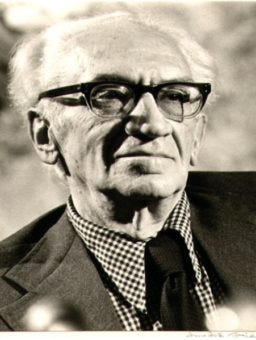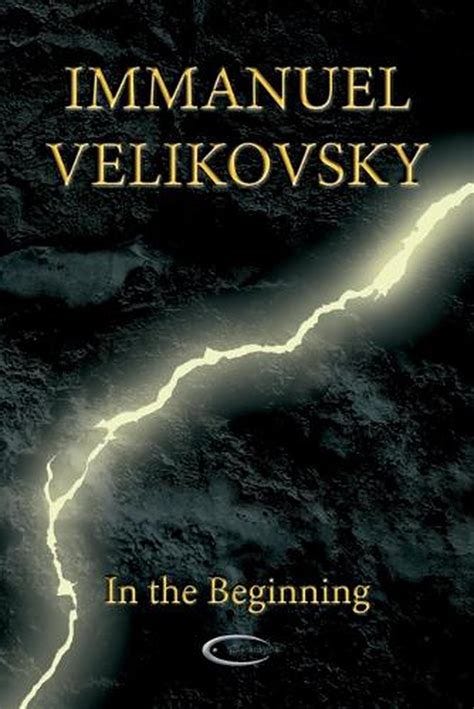Immanuel Velikovsky and 'In the Beginning'. In an age of clown world, question everything.
Exploding Darwin and Newton. No wonder he is hated by 'The Science'.
Immanuel Velikovsky, a Russian scientist and polymath, wrote ‘Worlds in Collision’ in 1950. It was a heretical book, challenging the dogma of Newtonian mechanics and the Darwinian stable-state theory of a world and universe within endless and unchanging ages. Velikovsky spent some 30-40 years in total, aggregating a mass of data from the realms of theology, science, geology, astronomy, cosmology and various related disciplines to offer various hypotheses about the young age of the earth, the reality of cosmological and geological catastrophism, the changing paths, natures, and compositions of the 9 planets in our solar system, the interaction and ‘wars’ between planets, and their impact on earth, human life, our history and our collective memory. In essence, Velikovsky using theological tracts from across the world, and situating Old Testament events against cosmological change and conflict, was able to construct a thesis that challenged all of the assumptions, vested interests, ‘laws’ and gospels, found in our modern world. You can well imagine the reaction of ‘the science’ to such a bold assault.
For some of the more sentient, the Corona Fascism and scamdemic should have forced a reappraisal of what we think we might know, and a reassessment of the world around us. From ‘health’, to the moon-landing, to ‘evolution’, to ‘long ages’, to the endless wars stretching from 1950 to the current NATO generated war against Russia in the Ukraine, to government and ‘democracy’, to ‘green’ projects and the ‘green-ness’ of solar, bird choppers and electric vehicles, to ‘climate’ and the hottest-days-ever, to even 9-11, all ‘facts’ and ‘science’, all that we know is up for analysis, debate, and rejection. In short, the world is not what it seems.
The fascism and evil of Corona should have been the clanging church bell, ringing emphatically and without cessation in the hour of great need, with the enemy at the gates and trying to scale the walls, waking up the citizens, demanding that the strong and capable man the walls, calling the loyal and intelligent to their duties to defend family and freedom. If ‘the science’ around ‘Corona’ and ‘viruses’ is so corrupt, so beholden to criminal industries and organisations such as Pharmaceuticals and the privately funded WHO, what else in our world is ‘wrong’? If like Neo, you feel that something just ‘isn’t right’, then reading Velikovsky is probably for you.
Velikovsky wrote an epic series which attempts to reconstruct our collective memory from the deep past and connect cultural, oral and religious traditions to what we can see and view around us in the physical and cosmological world. These works include: In the Beginning, Worlds in Collision (his most famous opus), Ages in Chaos, Earth in Upheaval, and Mankind in Amnesia. The key insight from Velikovsky is that our ancestors and their oral, cultural, written and religious stories, myths and beliefs were based on fact. These humans were rational as well as emotional and creative actors, and for Velikovsky it is clear that generations of humans experienced catastrophic events which transformed their view of life and the cosmos and these events were preserved in various traditions and handed down. Importantly these stories and beliefs are quite similar the world over and they revolve around the planets which interacted with our own. If they are true, they completely overturn much of what we think we know.
Take ‘In the Beginning’, which should be read as the first book of Velikovsky’s somewhat dense series of hypotheses, followed by ‘Worlds in Collision’. Velikovsky asks a lot of good questions which ‘The Science’ and even ‘The History’ cannot or dare not address, including inter-alia:
1-Why did all ancient people worship as the celestial God the planets in our solar system, in a similar order and pattern: the Moon, then Mercury, Saturn, Jupiter (Zeus, Odin), Mars, and lastly Venus?
2-Why would ancients venerate planets such as Saturn, Jupiter, Mars, Venus and Mercury which today are difficult to see without equipment? Was the Earth perchance a satellite of one of the large gaseous planets and recently ejected? Or were these planets more conspicuous, brighter or maybe closer to the Earth in epochs past?
3-Why would an ancient city state such as Rome (~700 B.C.) choose Saturn as the supreme ‘God’ of the cosmos? Was Saturn (also called a Sun in ancient times) closer to the Earth, brighter, more prevalent and obvious? Is this true for all the planets worshipped as God? How did the Māori’s in New Zealand, without advanced technology, know that Saturn has 2 rings? They are not visible to the naked eye in the modern era.
4-Ancient Rome and Greece have legends around Jupiter dethroning his father Saturn and casting Saturn to the underworld. Did Jupiter arrive in our solar system as a new planet and become entangled in the atmosphere of Saturn, a planet which is 4x smaller than Jupiter? Why do the ancients discuss the hair of Saturn being pulled by Jupiter (the planet literally being ripped apart), and ‘chains’ (rings) being bound to Saturn as it was cast down from its throne? How could the ancients have seen Saturn’s rings which are only visible now with high powered telescopes?
5-All ancient cultures discuss Saturn vomiting out his children as he loses his war with Jupiter. Are these children the comets which circle our solar system given that Saturn is a large gaseous planet emitting electromagnetic energy and at some point, material from its surface?
6-Did the Great Flood, discussed by every culture around the world, come in part from the water of Saturn as it fought for 7 days with Jupiter? Did Saturn eject material including water into the Earth’s atmosphere during its colossal battle? In 2018 probes confirmed that the water in Saturn’s rings is similar to water found on Earth.
7-Why do ancient Chaldeans, Mesopotamians, Greeks, Indians and others discuss an era or ‘phase of the world’, in which their ancestors lived without a Moon (called Sin in much of the ancient Near East)? Is the moon a recent capture by the Earth, a comet or some ejection from one of the two large gaseous planets?
8-The ending of the Bronze Age III was catastrophic (2000 BC to 1600 BC). Every culture has traditions of massive catastrophe from above and from the Earth. The Dead Sea for example did not exist when Abraham (c 2000 BC) entered Palestine, but during his lifetime the 5 cities of the plain of Siddim were destroyed, the Dead Sea was created, and the river Jordan was forced to change its flow. Could this and other catastrophic events during this period have a cosmological foundation as planets collided near to the Earth, or became entangled with the Earth?
9-All cultures attributed thunderbolts to Jupiter. The ancients knew the difference between earth bound and related thunder and lightning and the extra-terrestrial. Many stories and writings describe ‘bolts of lightning’ from Jupiter impacting the Earth with enormous destructive impact. An example might be the 5 prosperous if immoral cities in the plain of Siddim wiped out by ‘fire and brimstone’, the eradication described in the Old Testament is similar to a nuclear bomb explosion. Jupiter is represented in every culture as a great warrior destroying all before him, such as Shiva in Hindu mythology or Odin in Norse mythology.
10-Was Venus ripped out of Jupiter? Every ancient culture has Jupiter or Zeus giving birth to Venus. Did gold seed the earth after such an event? Gold is recent in the earth’s layers, lying close to the ground. Gold is not formed from within the Earth. Is it possible that gold was formed on the Earth due to an extraneous ‘rain’ from Jupiter or Venus?
These are just some points raised by Velikovsky.
In general, Velikovsky believes that there are ‘ages’ in the Earth’s history, marked by the dominance and interaction of one of the planets with the Earth. Many cultures around the world, discuss the ‘seven’ world-ages, each one dominated by a planet. For example, the Roman feast of Saturn (Osiris in Egypt) or Saturnalia, was a feast in December to commemorate the age when Saturn was God, an age according to Roman history, of plenty, peace and where according to Ovid and others ‘not a hoe hit the ground’. In this age, humans were vegetarian and were communal. No wars, conflicts, private property or even established laws were necessary during this age. At some point Jupiter or Zeus (Amon in Egypt, Marduk in Babylonia), overthrew Saturn and closed that age, bringing in a new age of conflict and strife (Velikovsky also discusses giants, including Nephilim, Anim found to exist in many ages including the Bronze Age, a fact supported by every culture).
Velikovsky makes many good and valid points, both scientifically and theologically. One does not have to agree with all that is said, as Velikovsky himself wrote, the reader can decide what is fiction or fact. But much of what he predicted, such as the temperature of Venus and its miles of dense cloud formation, is validated. ‘The Science’ predicted a surface temperature on Venus of 17 C, or 3 C more than the Earth’s average, based on billions of years of endless stable existence. The actual temperature is 800 C. ‘The Science’ cannot and will not explain this massive error. As with life on Mars, the moon landings, Corona, Globaloneywarming or Climate change, reality and facts which contravene the religious imperative of ‘The Science’ is ignored.
It should also be quite clear that the materialism of Darwin and the mechanics of Newton have impoverished our world view. The universe is not a clock, and the ages are not stable and without end, interruption, or massive change. The shrew does not become you, and planets as with atoms can change for many reasons due to internal or external stimuli. Religiously observing and bowing down before a 19th century, or a 17th century personality is hardly ‘scientific’ or even common-sensical. Demanding answers and proof is of course, scientific and rational. Velikovsky is hated because he asked hard questions.
‘The Science’ including Newtonian and Darwinian theology does not believe in oral or cultural traditions, and certainly not in immaterial, religious or theological insights or frameworks. Hypocritically ‘The Science’ of the modern era is of course a religious offering, tolerating no dissent, inquiry, or heretical views. Based predominantly on money, power and using technology including fraudulent data and complex mathematics as ‘proof’, ‘The Science’ can be viewed as ‘$cientism’, namely a religion which is preached and evangelised by an elite’s singular interpretation of the material world.
In the modern age of stupid, questioning everything is reasonable and Velikovsky’s questions still remain unanswered.





I agree with the main point you make (question everything). But this one line sticks out like a sore thumb: "the current NATO generated war against Russia in the Ukraine". You seem to state this as fact, because it counters the western narrative, even though it is in line with the Russian government narrative (which I assume you agree is also worthy of questioning).